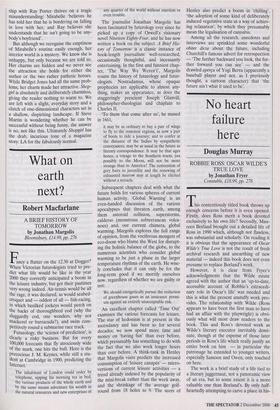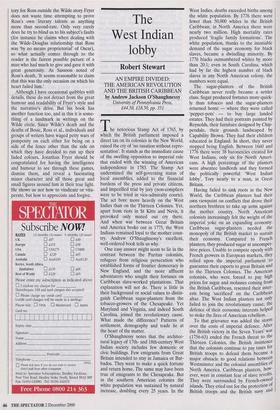No heart failure here
Douglas Murray
ROBBIE ROSS: OSCAR WILDE'S TRUE LOVE by Jonathan Fryer Constable, £18.99, pp. 278 his contentiously titled book throws up enough concerns before it is even opened. Firstly, does Ross merit a book devoted exclusively to his own life? Secondly, Mau- reen Borland brought out a detailed life of Ross in 1990 which, although not flawless, was substantial and scholarly. On reading it it is obvious that the appearance of Oscar Wilde's True Love is not the result of fresh archival research and unearthing of new material — indeed this book does not even presume to replace Borland's work.
However, it is clear from Fryer's acknowledgments that the Wilde estate agreed with the author that an 'up-to-date, accessible account of Robbie's extraordi- nary role in Oscar's life' was needed and this is what the present unstuffy work pro- vides. The relationship with Wilde (Ross appears to have been the first man to have had an affair with the playwright) is obvi- ously what will most draw readers to the book. This and Ross's devoted work as Wilde's literary executor inevitably domi- nate, though at the expense of those later periods in Ross's life which really justify an entire book on him — in particular the patronage he extended to younger writers, especially Sassoon and Owen, only touched on here.
The work is a brief study of a life tied to a literary juggernaut, not a panoramic view of an era, but to some extent it is a more valuable one than Borland's. By only half- heartedly attempting to carve a place in his- tory for Ross outside the Wilde story Fryer does not waste time attempting to prove Ross's own literary talents as anything more than second-rate. Only very rarely does he try to blind us to his subject's faults (for instance he claims when dealing with the Wilde-Douglas relationship that Ross was 'by no means proprietorial' of Oscar), so what actually comes through to the reader is the fairest possible picture of a man who had much to give and gave it with great generosity. As Sassoon noted of Ross's death, 'It seems reasonable to claim that this was the only occasion on which his heart failed him.'
Although I have occasional quibbles with details, these do not detract from the great humour and readability of Fryer's style and the narrative's drive. But his book has another function too, and in this it is some- thing of a landmark in writings on the Wilde circle. Since Wilde's death and the deaths of Bosie, Ross et al., individuals and groups of writers have waged petty wars of pomposity on each other for being on a side of the fence other than the side on which they have decided to run up their faded colours. Jonathan Fryer should be congratulated for having the intelligence and humour to see through these games, dismiss them, and reveal a fascinating minor character and all those great and small figures around him in their true light. He shows us not how to vindicate or vitu- perate, but how to appreciate and forgive.



















































































 Previous page
Previous page